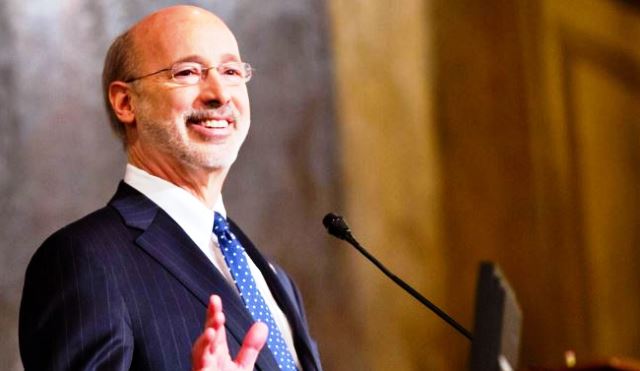HARRISBURG – Today, Gov. Tom Wolf outlined a different approach for Pennsylvania’s budget by tackling a $3 billion deficit without raising taxes on families, while protecting schools, seniors and resources used to battle the opioid epidemic, in addition to creating new tools for manufacturing and small businesses.
The governor’s budget eliminates the deficit by identifying cuts and savings initiatives in excess of $2 billion, imposing a severance tax and closing corporate loopholes.
Additionally, this budget bolsters education at all levels by increasing support by $209 million, expands efforts to combat the opioid epidemic, protects programs for seniors and individuals with disabilities and makes new investments in job training.
“I’m offering a budget proposal that represents a responsible solution to our deficit challenge – and a different approach from the way things have been done in Harrisburg for almost a generation. Let’s start here: In my proposed budget, there are no broad-based tax increases,” said Wolf.
“At the same time, my budget protects the investments we’ve made in education, in senior services, in fighting the scourge of opioids and in growing Pennsylvania’s economy.
“This proposal also closes corporate loopholes that have helped big companies avoid paying their fair share. I have nothing against successful businesses. I used to run one. But Pennsylvania families are already paying too much to help fund our government. And when big corporations get special treatment, Pennsylvania families and small businesses wind up shouldering more of a burden than they can bear.”
Finding Savings, Cutting Bureaucracy and Eliminating Waste
Since his first months in office, Wolf has focused on finding savings in state government, eliminating waste and bureaucracy in Harrisburg and shrinking the size of state government in order to provide better services to Pennsylvanians and protect families and seniors. This budget takes on tax loopholes and corporate handouts, rather than asking middle class families for more of their hard-earned money.
“By identifying specific programs that could be working more efficiently – and others that are no longer working at all – this budget proposes reforms that, altogether, will save taxpayers more than $2 billion,” Wolf said.
The governor’s $2 billion in cuts and savings rely on reforming government, eliminating waste and modernizing and improving state services for customers by getting rid of red tape and bureaucracy – not slashing important programs. This budget would also put the commonwealth back on a path of long-term fiscal stability by growing the rainy day fund from only $245,000 to nearly $500 million in five years.
Investing in our Children’s Future
Fair and increased education funding for all Pennsylvania schools continues to be one of Wolf’s top priorities in the budget to ensure students are college and career ready.
“Over the past two years, we’ve taken a different approach – instead of allowing schools to become the first casualty of our budget deficit, we’ve made them our first priority,” Wolf said. “We’ve undone nearly two-thirds of those short-sighted cuts to our public school system and we’ve made a historic investment in education for the commonwealth.”
The governor’s budget proposal includes a $100 million increase in Basic Education Funding, a $25 million increase in Special Education Funding, a $75 million increase in high-quality early childhood education and $8.9 million increase for the 14 universities of the Pennsylvania State System of Higher Education.
Creating Jobs that Pay for the Middle-Class
The governor’s budget includes $5 million in a manufacturing training-to-career grant partnership and creates a new apprenticeship grant program funded with revenue recovered from companies that fail to live up to commitments for job creation under economic development programs.
Additionally, this plan would generate $95 million in revenue annually by raising Pennsylvania’s minimum wage from $7.25 to $12 per hour, while tying it to inflation to maintain its purchasing power over time.
Wolf’s budget also creates a one-stop shop for small businesses in DCED to consolidate functions across departments and make it easier for businesses to start and grow.
Investing in What Matters Most to Pennsylvanians
For many years, the commonwealth has faced grave budget challenges. The previous administration, when faced with these challenges, slashed funding for schools and our most vulnerable Pennsylvanians while employing shifty accounting maneuvers that only worsened the shortfall in the long run.
By creating a new, unified Department of Health and Human Services by merging four separate agencies, Pennsylvania will be able to provide more streamlined services to older Pennsylvanians.
This will result in less confusion and easier access as constituents and their families seek services and will bolster resources for seniors seeking prescription drug assistance and care in their own homes.
Wolf has taken a different approach in order to protect services that matter most to Pennsylvanians. The 2017-18 budget continues to invest in battling the opioid epidemic by placing significant emphasis on expanding access to treatment and diverting those suffering from substance use disorder away from the criminal justice system and into supportive programs.
This budget also provides $26.2 million to move individuals with intellectual disabilities and autism from the waiting list and protects the lottery fund and programs that seniors depend on.
The transcript of the budget address as prepared is available here.
Pennsylvanians can find out more about Wolf’s budget at governor.pa.gov/budget.



